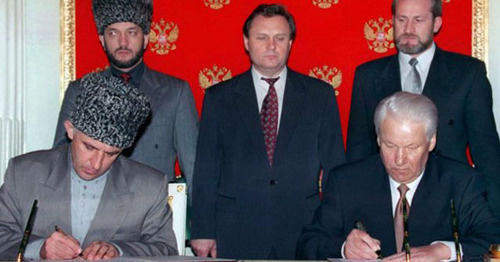
14 May 2017, 12:07
Peace treaty in Chechnya disrupted by populists 20 years ago
"The Treaty on Peace and Principles of Relations" between Russia and the self-proclaimed Chechen Republic of Ichkeria, concluded in May 1997, was disrupted by the authorities of Russia and Ichkeria under the influence of the populism of Russian law enforcers and Chechen field commanders. This opinion was voiced by human rights defenders.
On May 12, 1997, twenty years ago, Russian President Boris Yeltsin and Aslan Maskhadov, President of the Chechen Republic of Ichkeria, signed the "Treaty on Peace and Principles of Relations" between Russia and Chechnya, which consolidated the results of the First Chechen War.
Twenty years ago, the treaty concluded by Boris Yeltsin and Aslan Maskhadov "was perceived as a kind of positive event, the end of the war, and the possibility for new prospects." This was stated by Oleg Orlov, a member of the Human Rights Centre (HRC) "Memorial".
However, after the treaty had been signed, "the situation began to develop under a different scenario and all hopes for peace appeared to be unjustified," noted Oleg Orlov.
"This is a fault of politicians and society, both in Russia and in Chechnya. The matter is in the fact that in Moscow and Chechnya, supporters of the 'war party' gathered strength. Revanchist moods among Boris Yeltsin's subordinates began to prevail almost immediately after the treaty had been signed. The treaty with Chechnya was viewed only as a cover to prepare a revenge, for a new war. Members of the 'war party' in Moscow, among other things, supported the extremist forces in Chechnya," emphasized the human rights defender.
"Law enforcers, including the FSB and its chief Vladimir Putin quite frankly showed their unwillingness to follow the peaceful development of relations between the two parties to the treaty," said Oleg Orlov.
According to him, the Russian society "also faced growing opposition to agreements and treaties with Ichkeria." "Deputies of the State Duma and members of the Federation Council used the treaty to criticize Boris Yeltsin. A lot of politicians began to develop their PR on such criticism. The society turned out to be submissive to such a position, stating that 'the great country was humiliated,' that 'the victory was stolen,' and so on," emphasized Oleg Orlov.
The human rights defender believes that "the result was a new war, new destruction, crimes and victims."
Full text of the article is available on the Russian page of 24/7 Internet agency ‘Caucasian Knot’.
Author: Rustam Djalilov Source: CK correspondent




